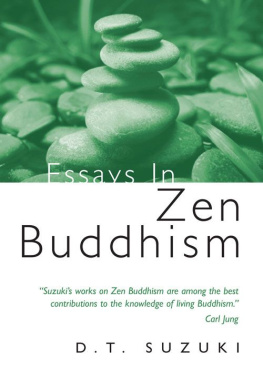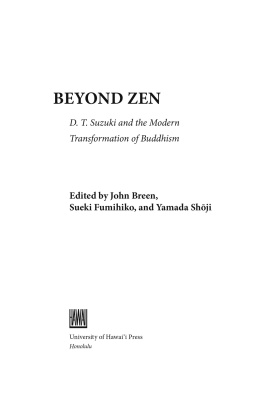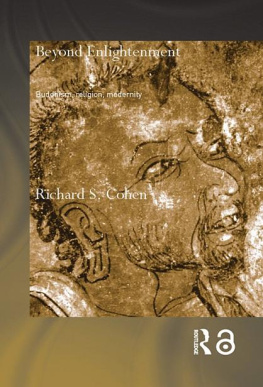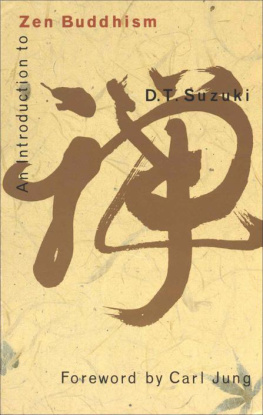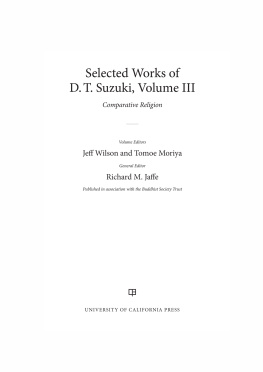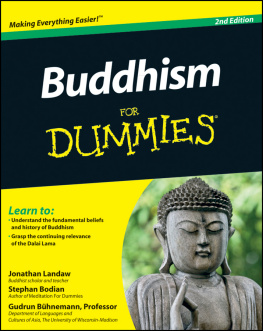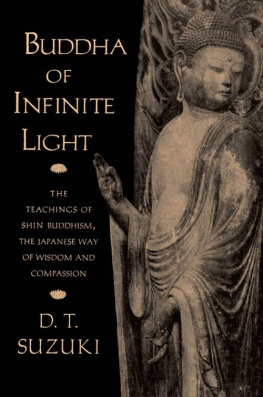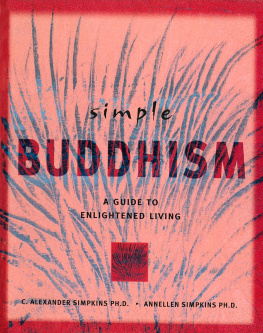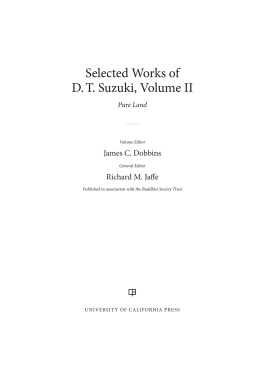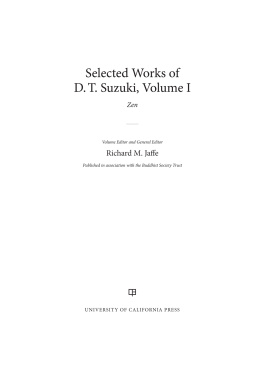
CONTENTS
Essay I
Essay II
Essay III
Essay IV
Essay V
Essay VI
Essay VII
Essay VIII
T HE most fruitful growth of Buddhism in the Far East has resulted in the development of Zen and Shin. Zen attained its maturity in China and Shin in Japan. The vigour and vitality which Buddhism still has after more than two thousand years of history will be realized when one comes in contact with these two branches of Buddhism. The one appeals to the inmost religious consciousness of mankind, while the other touches the intellectual and practical aspects of the Oriental mind, which is more intuitive than discursive, more mystical than logical. If Zen is the ultra self-power wing of Buddhism, Shin represents the other extreme wing known as the other-power, and these two extremes are synthesized in the enlightened Buddha-consciousness.
Since the publication of my short note on Zen Buddhism in the Journal of the Pli Text Society , 1907, nothing of importance has been published in English on the subject except Professor Kwaiten Nukariyas Religion of the Samurai , 1913. In fact, even in Japanese or Chinese, this branch of Buddhism has received very slight attention from modern writers of Buddhism. This is due to the peculiar difficulties which accompany the study of it. The Goroku (sayings) is the only literary form in which Zen expresses itself; and to understand it requires some special practical training in Zen, for mere knowledge of the Chinese, classical and historical, is far from being enough; even with the masterly understanding of the philosophy of general Buddhism, Zen is found quite hard to fathom. Some of such scholars sometimes try to explain the truth and development of Zen, but they sadly fail to do justice to the subject.
On the other hand, the Zen masters so called are unable to present their understanding in the light of modern thought. Their most intellectually productive years are spent in the Meditation Hall, and when they successfully graduate from it they are looked up to as adepts thoroughly versed in the ko-ans. So far so good; but, unfortunately from the scholarly point of view, they remain contented with this, and do not show any lively intellectual interest in the psychology and philosophy of Zen. Thus Zen is left to lie quietly sealed up in the Sayings of the masters and in the technical study of the koans; it is thus incapacitated to walk out of the seclusion of the cloisters.
Of course, great mistake it would be if one should ever take the notion even for a moment that Zen could be mastered from its philosophical presentation or its psychological description; but this ought not to mean that Zen is not to be intelligently approached or to be made somewhat accessible by our ordinary means of reasoning. I need not mention that my attempts in the following pages are anything but adequate for the rational treatment of the subject. But as a tentative experiment to present Zen from our common-sense point of view and as a direct lineage of Buddhist faith as first proclaimed, or rather realized, by the Buddha, I hope I have worked towards removing some of the difficulties usually besetting us in the mastery of Zen thought. How far I have succeeded or how utterly I have failedthis is naturally for the reader to judge.
The book is a collection of the Essays originally published in The Eastern Buddhist , except one on the History of Zen Buddhism which was written specially for this volume; but all of them have been thoroughly revised and in some parts entirely rewritten and new chapters added. The book will be followed by a second series of Essays before long, in which some more of the important points in the constitution of Zen will be treated.
The publication of these Essays in book form is principally due to the most liberal encouragement, both material and moral, of Mr. Yakichi Ataka, of Osaka, who is an old friend of the authors and who has not forgotten the pledge half seriously and half dreamily made in our youthful days. The author also owes a great deal to his wife in the preparation and revision of the MS., without which the book would have shown many more imperfections than it does now in various ways.
Lastly, in sending this humble work, not written in the authors native tongue, out to the world, he cannot help thinking of his late teacher in Zen, Soyen Shaku, of Engakuji, Kamakura, with regret that his life had not been spared for several years yet, not only for the sake of Japanese Buddhism but for many of his lamenting friends. This is the seventh autumn for the maple-trees to scatter their crimson leaves over his grave at Matsuga-oka. Might his spirit not for once be awakened from deep meditation and criticize the book now before the reader!
D AISETZ T EITARO S UZUKI .
Kyoto, October, 1926.
D AISETZ T EITARO S UZUKI , D.LITT. , Professor of Buddhist Philosophy in the Otani University, Kyoto, was born in 1869. He is probably now the greatest living authority on Buddhist philosophy, and is certainly the greatest authority on Zen Buddhism. His major works in English on the subject of Buddhism number a dozen or more, and of his works in Japanese as yet unknown to the West there are at least eighteen. He is, moreover, as a chronological bibliography of books on Zen in English clearly shows, the pioneer teacher of the subject outside Japan, for except for Kaiten Nukariyas Religion of the Samurai (Luzac and Co., 1913) nothing was known of Zen as a living experience, save to the readers of The Eastern Buddhist (19211939) until the publication of Essays in Zen Buddhism (Volume I) in 1927.
Dr. Suzuki writes with authority. Not only has he studied original works in Sanskrit, Pali, Chinese and Japanese, but he has an up-to-date knowledge of Western thought in German and French as well as in the English, which he speaks and writes so fluently. He is, moreover, more than a scholar: he is a Buddhist. Though not a priest of any Buddhist sect, he is honoured in every temple in Japan, for his knowledge of spiritual things, as all who have sat at his feet bear witness, is direct and profound. When he speaks of the higher stages of consciousness he speaks as a man who dwells therein, and the impression he makes on those who enter the fringes of his mind is that of a man who seeks for the intellectual symbols wherewith to describe a state of awareness which lies indeed beyond the intellect.
To those unable to sit at the feet of the Master his writings must be a substitute. All these, however, were out of print in England by 1940, and all remaining stocks in Japan were destroyed in the fire which consumed three quarters of Tokyo in 1945. When, therefore, I reached Japan in 1946, I arranged with the author for the Buddhist Society, Londonmy wife and myself as its nomineesto begin the publication of his Collected Works, reprinting the old favourites, and printing as fast as possible translations of the many new works which the Professor, self-immured in his house at Kyoto, had written during the war.
This undertaking, however, was beyond the powers of the Buddhist Society, and we therefore secured the assistance of Rider and Co., who, backed by the vast resources of the House of Hutchinson, can honour the needs of such a considerable task.
Of Zen itself I need say nothing here, but the increasing sale of books on the subject, such as The Spirit of Zen by Alan Watts (Murray) and the series of original translations of Chinese Zen Scriptures and other works published by the Buddhist Society, prove that the interest of the West is rising rapidly. Zen, however, is a subject extremely easy to misunderstand, and it is therefore important that the words of a qualified Master should come readily to hand.
Next page
